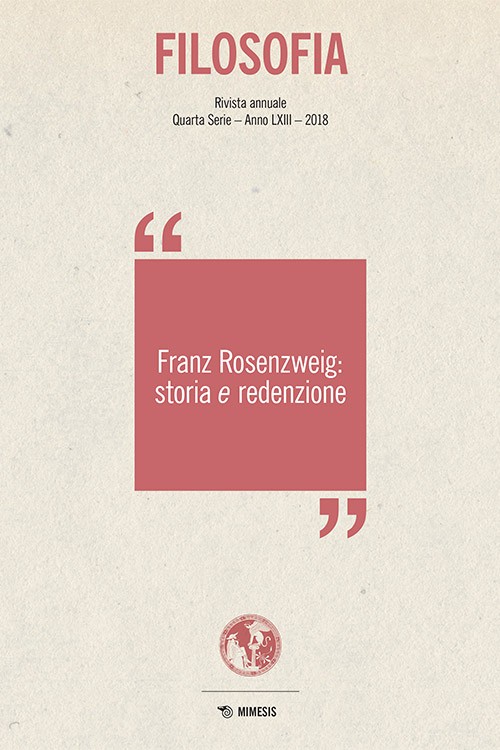The Problem of Jewish "Bildung" in Franz Rosenzweig’s "It Is Time" and “Of Bildung There Is No End”
DOI:
https://doi.org/10.13135/2704-8195/3795Parole chiave:
dialogical concepts of learning, Rosenzweig, Levinas, Leibowitz, open learning processAbstract
In his open letter to Hermann Cohen Zeit ists... (It Is Time) Franz Rosenzweig develops the idea of founding an Academy for the Science of Judaism as part of his new conception of Jewish learning. In his essay Bildung und kein Ende (“Of Bildung There Is No End”), he emphasizes that his goal is not to replace the study of Judaism in a university setting, but to establish collaboration between different traditions of learning as equals. The conjunction und (“and”) he uses in the title can be read as expressing the envisioned relationship between traditional Jewish and academic teaching, but also point to the difference between the two. Rosenzweig’s criticism addresses the subordination of Jewish traditions and Jewish learning to the norms of Western humanism.
Downloads
Riferimenti bibliografici
H. Ben-Pazi, Ethics Responsibility Dialogue. The Meaning of Dialogue in Lévinas’s Philosophy, in “Journal of Philosophy of Education”, L (2016), n. 4, pp. 619-639.
G. H. Cohn, Wie lieb’ ich deine Lehre, in N. Leibowitz, Studien zu den wöchentlichen Tora-Vorlesungen (1996-1998), Germ. transl. by A. Bodenheimer, ed. by G. H. Cohn, Jerusalem, Eliner Library, 2006, pp. 11-20.
A. J. Heschel, The Prophets, New York, The Jewish Publication Society of America, 1962.
M. Kaminska, Dilettantism and the education of the expert, in Philosophy as Lived Experience. Navigating through dichotomies of thought and action, ed. by M. Papastephanou, T. Strand and A. Pirie, Wien-Zürich-Berlin-Münster, LIT Verlag, 2014, pp. 123-133.
E. Levinas, Antihumanism and Education (1973), in Idem, Difficult Freedom. Essays on Judaism (19762), Engl. transl. by S. Hand, Baltimore, The Johns Hopkins University Press, 1997, pp. 277-288.
M. Maimonides, The Guide of the Perplexed, 2 vols., Engl. transl. by S. Pines, introductory essay by L. Strauss, Chicago-London, The University of Chicago Press, 1963.
M. Papastephanou, Education, risk and ethics, in “Ethics and Education”, I (2006), n. 1, pp. 47-63.
F. Rosenzweig, The Star of Redemption (1921), Engl. transl. by W. W. Hallo, New York-Chicago-San Francisco, Holt, Rinehart and Winston, 1971.
F. Rosenzweig, The New Thinking. A Few Supplementary Remarks to the Star (1925), Engl. transl. by A. Udoff and B. E. Galli, in Franz Rosenzweig’s “The New Thinking”, ed. by A. Udoff and B. E. Galli, Syracuse, Syracuse University Press, 1999, pp. 67-102.
F. Rosenzweig, It Is Time: Concerning the Study of Judaism (1917), Engl. transl. by W. Wolf, in Idem, On Jewish Learning, ed. by N. N. Glatzer, Madison, The University of Wisconsin Press, 2002, pp. 27-54.
F. Rosenzweig, “Of Bildung There Is No End” (Eccl. 12.12). Wishes concerning the Bildungsproblem of the moment, especially concerning the question of adult education (1920), Engl. transl. by M. Zank, in Textual Reasonings. Jewish Philosophy and Text Study at the End of the Twentieth Century, ed. by P. Ochs and N. Levene, London, SCM Press, 2002, pp. 229-239.
M. Zank, Franz Rosenzweig, the 1920s and the moment of textual reasoning, in Textual Reasonings, Jewish Philosophy and Text Study at the End of the Twentieth Century, ed. by P. Ochs and N. Levene, London, SCM Press, 2002, pp. 229-250.
##submission.downloads##
Pubblicato
Come citare
Fascicolo
Sezione
Licenza
Filosofia applica una licenza Creative Commons Attribution 4.0 International License a tutto il materiale pubblicato.




